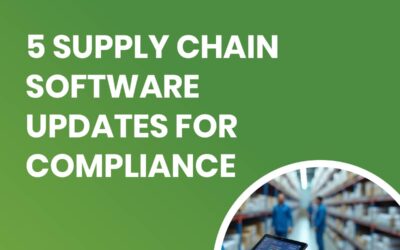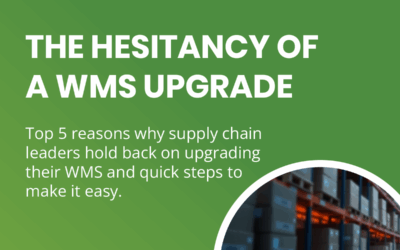TRYON BLOG
How to Prep and Undertake a Supply Chain Execution Go Live as a Client

You’ve chosen a supply chain execution system (WMS, WLM, etc…) along with a vendor to handle the implementation, and all parties have agreed upon on a timeline. So…What’s next? We can sit around patting each other on the back for finally bringing our operation up-to-date or, conversely, bite our nails with worry in the leadup to the eventual go live.
While a little back-slapping, atta-boy/girl, and nail-biting is healthy, we beseech you to prepare and assist at specific points during all implementation phases. The vendor will handle the vast majority of the effort, but your team should not be entirely on the sidelines. In addition to this article, be sure to download our handy Go Live Checklist and check out our articles on Go Live Wisdom and Steps to Outsourcing WMS Service.
Early Prep:
- Hold a kickoff meeting that involves all stakeholders, ensure buy-in from everyone present at all levels, and determine proper communication channels.
- Create a go live checklist. Do not rely solely on the “noggin’ checklist”, and if your team doesn’t have one then feel free to use our Go Live Checklist.
- Ensure that the overall plan and runbook is written in-stone including an accountability matrix, timelines of what will be brought online, and the operations validating that those systems are working as designed.
- Hash out a post-go live support plan that covers all hours of operation as early as possible. The more notice you give your vendor, the more likely support personnel will be available to handle post go live hypercare.
- Put a well-documented test plan in place. All facets should be covered including core process smoke tests, integration and UAT. If the project scale and/or complexity warrants then you may also consider test automation.
- Neglect change management at your own peril. Make sure the right personnel (that possess the right expertise) have all bought into the plan and are available to be engaged when needed. Identify and strategically place/involve champions, as you want them to feel some ownership over the implementation. Develop new champions by finding aspects of the system that could motivate them; maybe their SOP will be easier in the long run or perhaps the new dashboards could help better inform them. In addition to personnel, prepare the actual site(s) for change.
- Determine the training plan. Prepare standard and power user perspective training plans, as well as a management curriculum that includes key reports and dashboards. Toss technical training into the mix as well if there is no vendor support post-implementation. Draft SOPs for all warehouse processes and personnel, and expect this to take time as it requires a common agreement among everyone on how the system will be used.
- Proper data strategy and governance is critical. Get all of the requisite data out of legacy systems WELL in advance; especially inventory! Look at more than just the basic fields, but also consider things like lot control or serialized information. You do not want to bring everything over to the new system only to realize key data was left out. It’s nice to know what kind of fresh fruit you have, but its even better to additionally know when it expires and becomes not-so-fresh.
- The cutover plan should involve the business side, and not just IT and operations. Not implementing on Cyber Monday might be obvious, but the business folks will know other seasonal days or periods to avoid.
- Do not implement other independent systems at the same time. Minimize risk by only changing one thing at a time.
- Read through our Go Live Nuggets of Wisdom article.
Later Prep:
- Conduct the hugely important and potentially dramatic “Go or no go?” meeting. While everyone is assembled, verify that the ducks are properly in a row and that all are aligned on both plan and timeline.
- Have a clearly-defined roll-back plan in the event something goes wrong.
- Ensure your vendor has the required access, including both virtual (servers) and physical (buildings).
- Perform last-minute backups
During:
- Secure and distribute the strongest coffee available by law, and if that isn’t potent enough then explore illegal options.
- Monitor the runbook and confirm that tasks are being finished on-time and defect-free, and that progress is being reported to key stakeholders.
- Hold periodic standup calls where key stakeholders are updated and they can freely ask questions; especially if they are not located at the affected sites.
Post:
- Don’t celebrate too soon! Stay focused until after the dust has truly settled, and you will know when that occurs because that milestone was officially determined in the early prep phase.
- Put together a post-production validation plan. Do “road checks” across the system including a little bit of everything like receiving, putaway, picking, and outbound operations. Ramp up from pushing 100 orders to a 1000 from start-to-finish. The end goal is validation that the system and related processes are all working.
- Validate other systems. Check your ERP and/or any other supply chain execution system that integrates with what just came online.
- Double-check the support plan. Ensure your team can reach the primary customer care contact.
Be sure to carefully select a solution provider based on your supply chain execution needs, and then build an ongoing relationship with them so that they become familiar with your systems and processes. Do you have any supply chain execution system challenges? Drop us a line, as this is our specialty.

Co-Written By Tim Merrit
Tim, Director of PMO at Tryon Solutions, has a broad background in various aspects of supply chain management from both operational and systems perspectives. His career spans transportation management, operational management, and information technology. He has led large cross-functional teams and managed significant, complex projects for Fortune 100 clients while also finding time to develop and mentor talent.

Co-Written By James Prior
With over two decades in software pre-sales and implementation since 2000, James specialized in working with pre-sales teams and contributed to blog posts. For further information, please email sales@tryonsolutions.com.
More From This Category
5 Supply Chain Software Updates for Compliance
The regulatory landscape for pharma and medical device companies is shifting faster than ever....
The Hesitancy of a WMS Upgrade
Top 5 reasons why supply chain leaders hold back on upgrading their WMS and quick steps to make...
6 Levers for Smarter WMS Support
Whether you're juggling school drop-offs, remembering a birthday party, or trying to reply to...



